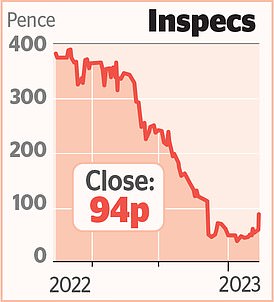MARKET REPORT: Wizz Air loses altitude as recovery lags rivals
>
Shares of Wizz Air fell on fears the pace of recovery would lag rivals.
It posted a surge in ticket sales, more than doubling its revenue to £802 million in the three months to December. That came as it carried nearly 12.4 million passengers in the third quarter, up 59.1 percent from the same period a year earlier.
The occupancy rate – the number of seats sold on each flight – increased by 10.2 percentage points to 87.3 percent.
Fuller flights: Wizz Air posted a sharp increase in ticket sales, more than doubling revenue to £802m in the three months to December
Wizz bounced back to a £30 million profit, following a £235 million loss a year earlier.
While it is still on track to turn a loss at the end of the current fiscal year, it has targeted a return to profit in the year to April 2024.
This contrasted with this week’s update from Easyjet, which said it will return to the black this year after three years of losses. It also reported record bookings for summer holidays.
When asked if Wizz had seen the same thing, boss Jozsef Varadi said: ‘The bookings are strong, but I don’t want to get too excited. We see that the market remains intact. People keep flying.’
There was positive news for Jet2 as the airline and package travel company upgraded its earnings forecast for the year with bookings for next winter ahead of them before the pandemic hit.
As a result, profit for the year to March is expected to be between £370m and £385m, much higher than the £317m analysts had expected.
Wizz fell 7.2 percent, or 216p, to 2796p while Jet2 added 2.5 percent, or 29.5p, to 1207p and Easyjet rose 0.3 percent, or 1.6p, to 515p.
The FTSE 100 ended its two-day losing streak with a return to positive territory – up 0.21 percent, or 16.24 points, to 7761.11 while the FTSE 250 climbed 0.56 percent, or 111.47 points, to 19915.51.
Official figures in the US showed that the economy grew at an annual rate of 2.9 percent in the last three months of 2022.
This beat estimates of 2.6 percent, but still fell short of the 3.2 percent growth achieved in the previous quarter.
Back in London, Prudential is poised to open a branch of its Hong Kong operations in Macau, expanding the insurer’s presence to 24 markets in Asia and Africa. It rose 2.8 percent, or 37.5 pence, to 1371.5 pence.
Private equity firm 3i rose 9.2 percent, or 134p, to 1594p after excellent results for its largest investment. Action, the non-food discount retailer that owns more than 2,000 stores in 10 countries, reported a 30 percent increase in sales and a 40 percent increase in profits for the year to January as affordable prices attracted more customers.
Asset manager St James’s Place rose 1.5 percent, or 17.5 pence, to 1,217 pence after brushing aside financial market turbulence to deliver its second-best year for bringing in new money.
It took in £3.9bn in the three months to December and reported £2.1bn in net inflows, bringing its total for the year to £9.8bn.
IG Group revenues rose 10 per cent in the six months to November to a record £519.1 million.
The trading firm said clients found “opportunities to trade” despite economic pressures around the world. Shares rose 1.3 percent, or 10p, to 790p.
Britvic, the drinks maker behind Robinsons, saw sales jump 9.9 per cent to £411 million in the three months to December, thanks to strong holiday trading.
There was little to cheer for Greencore, as the sandwich maker warned that the slow start to the year, exacerbated by union action, and rising labor and energy costs, would mean results would be weaker than hoped. Shares fell 3.3 percent, or 2.55 pence, to 73.9 pence.
Elsewhere, shares in Applied Graphene Materials will be suspended from Feb. 1 after it admitted it will miss the Jan. 31 deadline to publish its accounts. It fell 8.9 percent, or 0.6 pence, to 6.15 pence.
Some links in this article may be affiliate links. If you click on it, we may earn a small commission. That helps us fund This Is Money and use it for free. We do not write articles to promote products. We do not allow any commercial relationship to compromise our editorial independence.

